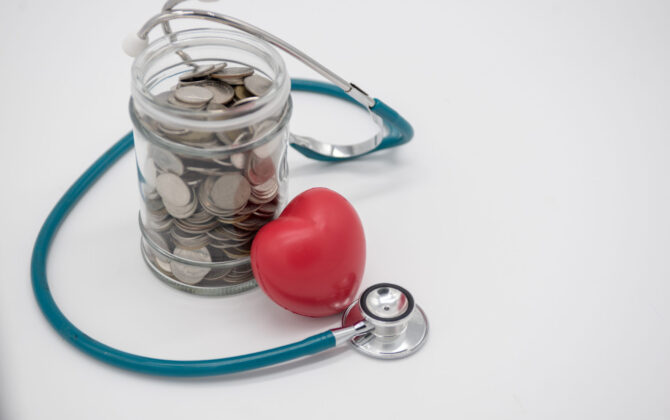How Much Should Dentists Save for an Emergency Fund?
Investing in an emergency fund is a key element to early financial planning because it can help you avoid getting — or falling deeper — into debt.


As a dentist, you may often hear reminders to check up on your mental and physical health. But what about your financial health and well-being? Investing in an emergency fund is a key element to early financial planning because it can help you avoid getting — or falling deeper — into debt.
An emergency fund is easily accessible cash that is set aside for potentially large and/or unexpected expenses, such as an urgent home repair, medical bill, or job loss.
As a high earner (or future high earner) with fairly high job security, you may think you’re exempt from needing an emergency fund. Now, that may be true for a later-career dentist who has built up their savings, but for dental students, residents, and dentists early in their career, building an emergency fund is a good idea.
One rule of thumb with emergency funds is to make sure that the funds are liquid and easily accessible. If you have to jump through hoops or pay penalties for early withdrawals to get money out of your emergency fund, it isn’t really serving its purpose.
How to calculate your emergency fund goal
How much cash you need to have in an emergency fund varies, but most financial experts recommend saving enough money to cover three to six months’ worth of necessary expenses like rent, food, and utilities.
The 50/30/20 budget rule can also help you calculate how much you can and should save. The rule suggests breaking up your monthly income, after taxes, into three categories: 50% of your income goes to needs, 30% goes to wants, and 20% goes to extra payments on your debts, retirement savings, and other savings, which includes emergency funds.
So, for example, if you’re a new dentist taking in $6,000/month after taxes, you’d have $3,000 for needs, $1,800 for wants, and $1,200 for savings and extra payments toward your debts. If you split the last category evenly into extra debt payments, retirement contributions and building an emergency fund, you’d be able to put $400/month toward your emergency fund. If you stayed on track and continued that every month, it would take about 23 months to save $9,200, or three months’ worth of needs.
Where to put your emergency funds
Emergency funds are best deposited into accounts with high interest rates that allow easy, penalty-free withdrawals. High-yield savings accounts and money market accounts are both good options, as they fit the bill on both counts.
High-yield savings accounts may have a minimum balance requirement that you should keep an eye on when comparing accounts.
Money market accounts may allow unlimited withdrawals but may also require a larger deposit to open and could have a higher minimum balance to maintain.
Retirement accounts, like 401(k)s, 403 (b)s and Roth IRAs, while great for long-term savings, aren’t ideal for holding your emergency funds. If you make a withdrawal from your retirement account and you’re under the age of 59 ½, you’ll likely get hit with income tax on your withdrawal and face a 10% penalty when you file your taxes.
Build your emergency fund during your early career
While dentists won’t typically face an unexpected job loss, it’s impossible to know what the future will hold. You might have to take unpaid parental leave or a medical leave of absence. Many dentists faced fewer employment opportunities and potentially months of unemployment because of COVID-19 closures. These situations are unpredictable — but that’s why an emergency fund is so powerful to have in your back pocket.
Dentists also might have to deal with out-of-pocket costs for conferences, including registration, airfare, and lodging. There are also other expenses such as licensing exams and continuing education. These can all lead to cash flow issues, so having an emergency fund for these “planned” emergencies can help you stay afloat.
Why start building an emergency fund while you still have student loans?
Being in debt shouldn’t prevent you from saving money — otherwise many people would never save. Ideally, you want to strike a balance between paying off debt and saving.
You may be reluctant to put money into an emergency fund while you still have student loans, but remember that any credit card or personal loan debt you take on due to an emergency will have a much higher interest rate than your student loans, assuming you’re able to get access to credit in the event of a job loss.
Financial goals always require prioritization, and while both emergency savings and paying off your debt are important, being prepared for an emergency should be a top priority.
Even if reaching three to six months’ worth of expenses seems unattainable given your student loan debt, just adding $50 each month to your emergency fund can help you build a cushion for unexpected events and help you build the habit of saving.
Early career emergency fund: Building a safe foundation for your wealth
Depending on the level of your career, you may have different goals for your emergency fund. Early on, you’ll want a stable and reliable foundation.
For later career dentists with a more stable cash flow, you may be asking yourself: “I have an emergency fund. Now what?” As you’re continuing to stock away funds, you may want to transition from a savings mindset to an investment mindset. But before you make a substantial investment, you’ll want to assess your risk tolerance and time horizon.
Late career emergency fund: Changing how you think about liquidity
Once you’re later in your career as a dentist and have substantial and diversified investments, you may feel financially secure enough to not even need a traditional emergency fund.
Eventually, you may have enough liquid cash in other accounts, like your regular checking or savings account, to avoid any immediate cash flow issues. As you near retirement age, your access to retirement accounts won’t include the typical withdrawal penalties.
According to the FDIC as of June 2022, the average national APY on traditional savings accounts is just 0.08%, so a traditional emergency fund won’t necessarily have huge gains. The benefit of emergency savings is not the high rate of return you receive on those investments, but rather the peace of mind that comes with being prepared for the unexpected.
Dealing with the unexpected is never fun. And whether you do so with a traditional emergency fund or build up substantial liquid cash in other ways to handle these types of expenses, you can keep yourself from falling into a financial hole.
In providing this information, neither Laurel Road nor KeyBank nor its affiliates are acting as your agent or is offering any tax, financial, accounting, or legal advice.
Any third-party linked content is provided for informational purposes and should not be viewed as an endorsement by Laurel Road or KeyBank of any third-party product or service mentioned. Laurel Road’s Online Privacy Statement does not apply to third-party linked websites and you should consult the privacy disclosures of each site you visit for further information.
Don’t miss the latest financial resources.
This site is protected by reCAPTCHA and the Google Privacy Policy and Terms of Service apply.
Get tailored Laurel Road resources delivered to your inbox.
Search Results


